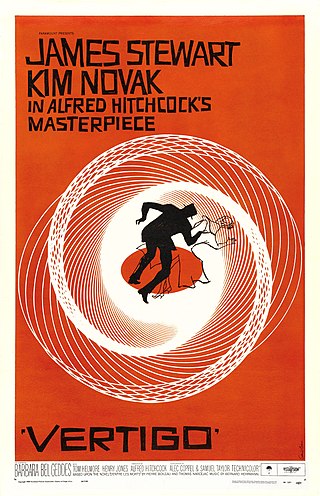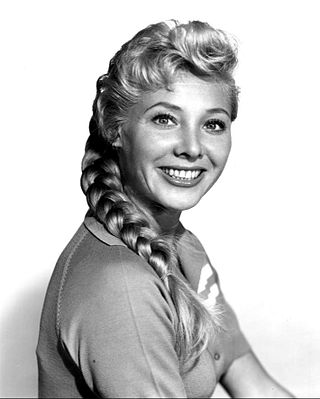Related Research Articles

Sir Alfred Joseph Hitchcock was an English film director, screenwriter, producer and editor. He is widely regarded as one of the most influential figures in the history of cinema. In a career spanning six decades, he directed over 50 feature films, many of which are still widely watched and studied today. Known as the "Master of Suspense", he became as well known as any of his actors thanks to his many interviews, his cameo roles in most of his films, and his hosting and producing the television anthology Alfred Hitchcock Presents (1955–65). His films garnered 46 Academy Award nominations, including six wins, although he never won the award for Best Director, despite five nominations.
Andrew Sarris was an American film critic. He was a leading proponent of the auteur theory of film criticism.

Foreign Correspondent is a 1940 American black-and-white spy thriller film directed by Alfred Hitchcock. It tells the story of an American reporter based in Britain who tries to expose enemy spies involved in a fictional continent-wide conspiracy in the prelude to World War II. It stars Joel McCrea and features 19-year-old Laraine Day, Herbert Marshall, George Sanders, Albert Bassermann, and Robert Benchley, along with Edmund Gwenn.

Rear Window is a 1954 American mystery thriller film directed by Alfred Hitchcock and written by John Michael Hayes based on Cornell Woolrich's 1942 short story "It Had to Be Murder". Originally released by Paramount Pictures, the film stars James Stewart, Grace Kelly, Wendell Corey, Thelma Ritter, and Raymond Burr. It was screened at the 1954 Venice Film Festival.

Vertigo is a 1958 American psychological thriller film directed and produced by Alfred Hitchcock. The story was based on the 1954 novel D'entre les morts by Boileau-Narcejac. The screenplay was written by Alec Coppel and Samuel A. Taylor. The film stars James Stewart as former police detective John "Scottie" Ferguson, who has retired because an incident in the line of duty has caused him to develop acrophobia and vertigo, a false sense of rotational movement. Scottie is hired by an acquaintance, Gavin Elster, as a private investigator to follow Gavin's wife, Madeleine, who is behaving strangely.
John Russell Taylor is an English critic and author. He is the author of critical studies of British theatre; of critical biographies of such figures in film as Alfred Hitchcock, Alec Guinness, Orson Welles, Vivien Leigh, and Ingrid Bergman; of Strangers in Paradise: The Hollywood Emigres 1933–1950 (1983); and several books on art.

Richard Franklin was an Australian film director.
Identification refers to the automatic, subconscious psychological process in which an individual becomes like or closely associates themselves with another person by adopting one or more of the others' perceived personality traits, physical attributes, or some other aspect of their identity. The concept of identification was founded by psychoanalyst Sigmund Freud in the 1920’s, and has since been expanded on and applied in psychology, social studies, media studies, and literary and film criticism. In literature, identification most often refers to the audience identifying with a fictional character, however it can also be employed as a narrative device whereby one character identifies with another character within the text itself.

Alfred Hitchcock (1899–1980) was an English director and filmmaker. Popularly known as the "Master of Suspense" for his use of innovative film techniques in thrillers, Hitchcock started his career in the British film industry as a title designer and art director for a number of silent films during the early 1920s. His directorial debut was the 1925 release The Pleasure Garden. Hitchcock followed this with The Lodger: A Story of the London Fog, his first commercial and critical success. It featured many of the thematic elements his films would be known for, such as an innocent man on the run. It also featured the first of his famous cameo appearances. Two years later he directed Blackmail (1929) which was his first sound film. In 1935, Hitchcock directed The 39 Steps; three years later, he directed The Lady Vanishes, starring Margaret Lockwood and Michael Redgrave.

George Tomasini was an American film editor, born in Springfield, Massachusetts, who had a decade long collaboration with director Alfred Hitchcock, editing nine of his movies between 1954 and 1964. Tomasini edited many of Hitchcock's best-known works, such as Rear Window (1954), Vertigo (1958), North by Northwest (1959), Psycho (1960), and The Birds (1963), as well as other well-received films such as Cape Fear (1962). On a 2012 listing of the 75 best edited films of all time, compiled by the Motion Picture Editors Guild based on a survey of its members, four films edited by Tomasini for Hitchcock appear. No other editor appeared more than three times on this listing. The listed films were Psycho, Vertigo, Rear Window, and North by Northwest.
Alfred Hitchcock's films show an interesting tendency towards recurring themes and plot devices throughout his life as a director.

Murray Pomerance is an independent Canadian film scholar and author living in Toronto, Ontario, Canada, and adjunct professor in the School of Media and Communication at RMIT University, Melbourne.

David Sterritt is a film critic, author and scholar. He is most notable for his work on Alfred Hitchcock and Jean-Luc Godard, and his many years as the Film Critic for The Christian Science Monitor, where, from 1968 until his retirement in 2005, he championed avant garde cinema, theater and music. He has a Ph.D. in Cinema Studies from New York University and is the Chairman of the National Society of Film Critics.
A romantic thriller is a narrative that involves elements of the romance and thriller genres. A good thriller provides entertainment by making viewers uncomfortable with moments of suspense, or the heightened feeling of anxiety and fright. A thriller is more a familiar concept and description than a pure genre. A typical genre can vary from comedy and melodrama to adventure and romance. All thrillers are a combination of different genres. The basic thriller trait of suspense fits with some genres better than others. For example, crime, sci-fi and romance allow more scope for suspense than Screwball Comedies or musicals do.

Georgine Darcy was an American dancer and actress best known for her role as "Miss Torso" in the 1954 Alfred Hitchcock film Rear Window. She also had a regular role in the 1960-61 sitcom Harrigan and Son.
This is a bibliography of reference works on film by genre.

Elisabeth Bronfen is a Swiss/German/American literary and cultural critic and academic. She is a professor and chairholder for English literature at the University of Zurich as well as a global distinguished professor at New York University. Her research interests include 19th- and 20th-century American and British literature, gender studies, psychoanalysis as well as the intersection and interaction between different cultural media.
William Rothman is an American film theorist and critic. Since receiving his Ph.D. in philosophy from Harvard University in 1974, he has authored numerous books, including Hitchcock: The Murderous Gaze (1982), The “I” of the Camera: Essays in Film Criticism, History and Aesthetic (1988), and Tuitions and Intuitions: Essays at the Intersection of Film Criticism and Philosophy (2019). He was "part of a modern wave of thinkers to apply questions of philosophy to the medium of movies" during the 1980s, and his work contributed to the emergence of the sub-discipline that has come to be known as “film-philosophy.” Rothman has also written on aspects of film theory and on the writings of Stanley Cavell, an American philosopher who made film a major focus of his work. He is currently Professor of Cinematic Arts in the School of Communication at the University of Miami.
Robert Phillip Kolker is an American film historian, theorist, and critic. He has authored and edited a number of influential books on cinema and media studies. He is a Professor Emeritus at the University of Maryland, College Park.
References
- ↑ "Faculty Profiles, English Department". Rutgers, The State University of New Jersey. 2008. Archived from the original on 2008-05-11. Retrieved 2008-05-15.
- ↑ Konczal, Eddie F. "Belton, John". english.rutgers.edu. Retrieved 2023-09-30.
- ↑ "Awards and Recognitions, English Department". Rutgers, The State University of New Jersey. 2008. Archived from the original on 2008-07-19.
- ↑ Belton, John (2002). Alfred Hitchcock's Rear Window. Cambridge University Press. p. 1.
{{cite book}}: CS1 maint: location missing publisher (link)